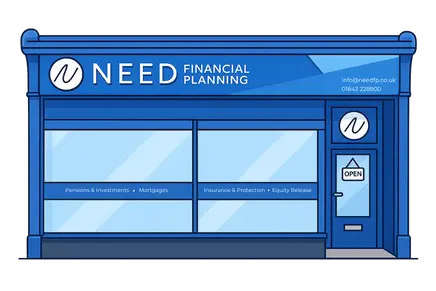Buying a House with No Deposit
Dreaming of buying a home but worried because you don’t have a deposit? You’re not alone. Rising property prices mean saving even 5% can feel impossible. The good news is that there are options, some government-backed, some through lenders, and some with family support.
We'll walk you through the different routes available, what the risks are, and how to work out if a no-deposit mortgage is right for you.

Quick Takeaways:
True “no deposit” mortgages are rare, but options exist
''Guarantor'' and family-assist mortgages can make buying possible
Government schemes like Shared Ownership can reduce upfront costs
Low-deposit mortgages (5%) are much more widely available
Friendly, expert mortgage advice backed by our happy clients.
What Does 'No Deposit' Really Mean?
A no-deposit mortgage is often called a 100% mortgage. In practice, lenders are cautious about these, because if property values fall, the risk of negative equity rises. Negative equity is where your mortgage balance is more than the value of your property, making it hard to get a new mortgage deal or move home.
That’s why most lenders don’t currently offer 100% mortgages — but there are alternative ways forward.
Your Options if You Have No Deposit
1. Guarantor/ Family-Supported Mortgages
A family member (often parents) can help you onto the ladder by using their savings or home equity as security against your mortgage.
Because the 'guarantor' provides this security, you won’t usually need to put down a deposit yourself.
The most common setup involves savings:
Your family member places a lump sum (often 10% of the property value) into a fixed savings account linked to your mortgage.
These savings are held for your initial fixed period, usually 3–5 years.
As long as you keep up with your repayments, the money is returned at the end of that period (plus any interest earned).
The idea is that during those 3–5 years, your property should rise in value (or you’ll have paid down enough of the loan) to remortgage onto a standard 90% mortgage without needing a guarantor.
Some lenders allow guarantors to use equity in their own home instead of savings, but this carries more risk for the family member, so it’s important to get legal advice first.
2. Government Schemes
Shared Ownership – Buy a share of a property (usually 25%–75%) and pay rent on the rest. Deposit required is only on the share you buy.
First Homes scheme – Certain new-build properties are sold at a discount to first-time buyers and key workers.
Right to Buy – Council tenants can use their discount as a deposit.
3. Low-Deposit Mortgages (5%)
5% deposit mortgages are widely available, often with competitive rates.
Supported by the Government’s Mortgage Guarantee Scheme.
Can be an easier, more sustainable step than pushing for 100% borrowing.
4. Gifted Deposit
Not everyone has access to family support, but for those fortunate enough, a gifted deposit can be a huge help in buying a home.
A gifted deposit is when a family member (often parents or grandparents) gives you money towards your deposit. Lenders will usually require a letter confirming it’s a gift, not a loan, and that the giver has no financial interest in the property.
Where gifted deposits often come from:
Savings – parents or family members contributing directly
Inheritance – either received upfront or gifted by family in advance
Equity Release – some parents/grandparents choose to release equity from their own property to help the next generation onto the ladder
While 100% mortgages may sound like the perfect solution, they won’t suit everyone. For many, a 5% deposit mortgage or a family-assist product may be safer and more sustainable.
5. 100% / Zero-Deposit Mortgage
A true 100% mortgage (or 0% deposit mortgage) means borrowing the full property value with no deposit at all. These products disappeared after the 2008 financial crisis, but a handful of lenders are cautiously re-entering the market.
The most well-known option right now is Skipton’s Track Record Mortgage. This product is aimed at renters who can prove a solid history of paying rent (often at amounts similar to or higher than what a mortgage repayment would be). If you can show at least 12 months of consistent rent payments, you may be considered, even without a deposit.
Why caution is needed:
If house prices fall, you’re at higher risk of negative equity (owing more than your home is worth).
Interest rates are often higher than for low-deposit mortgages.
Very strict criteria — you'll need to tick a lot of boxes to be approved.
FAQs
Can I get a 100% mortgage in the UK?
Yes, but only through certain specialist or family-assist mortgages. Most mainstream lenders still require at least 5%.
Do I need a good credit score for a no-deposit mortgage?
Yes, lenders are stricter because of the higher risk. A strong credit history is usually essential.
Can I use a personal loan as a deposit?
Generally no. Most lenders won’t accept borrowed money as a deposit.
Need a Hand?
If you’re looking at your options and feeling overwhelmed, you’re not alone. Mortgages with little or no deposit can feel complicated — but there are solutions.
Ready to explore your options?

Prefer to email first? No problem!
Submit your enquiry here →
Need a Hand?
If you’re looking at your options and feeling overwhelmed, you’re not alone. Mortgages with little or no deposit can feel complicated — but there are solutions.
Ready to get started?
Prefer to email first? No problem!
Submit your enquiry here →

What our clients say about us ✪✪✪✪✪
We’re proud to help homeowners, buyers, and investors across Broadstairs, Kent and beyond with expert mortgage and financial advice. See what our happy clients have to say!
You may also like:
Stamp Duty Calculator
Find out exactly how much Stamp Duty you’ll need to pay when buying a property — whether you’re a first-time buyer, moving home, or investing.
Jargon Buster
A complete jargon buster glossary A–Z. Quickly find clear, simple definitions for common industry terms, acronyms, and phrases.
First-time Buyer Guide
A comprehensive First-Time Buyer Guide, tailored to provide you with the knowledge and confidence needed to make informed decisions.
THINK CAREFULLY BEFORE SECURING OTHER DEBTS AGAINST YOUR HOME.
YOUR HOME MAY BE REPOSSESSED IF YOU DO NOT KEEP UP REPAYMENTS ON YOUR MORTGAGE OR ANY OTHER DEBT SECURED ON IT.
IMPORTANT: With investments, your capital is at risk. Pensions and investments can go down in value as well as up, so you could get back less than you invest.
Need Financial Planning Ltd is registered in England and Wales no. 10901658. Registered office, 123 High Street, Broadstairs, Kent, CT10 1NQ. Authorised and regulated by the Financial Conduct Authority. Need Financial Planning Ltd is entered on the Financial Services Register https://register.fca.org.uk/ under reference 977136. If you wish to register a complaint, please write to [email protected] or telephone 01843 228800. A summary of our internal complaints handling procedures for the reasonable and prompt handling of complaints is available on request and if you cannot settle your complaint with us, you may be entitled to refer it to the Financial Ombudsman Service at www.financial-ombudsman.org.uk or by contacting them on 0800 0234 567.
© Copyright 2022 Need Financial Planning Ltd. All rights reserved. Privacy Policy | Disclaimer | Cookie Policy

